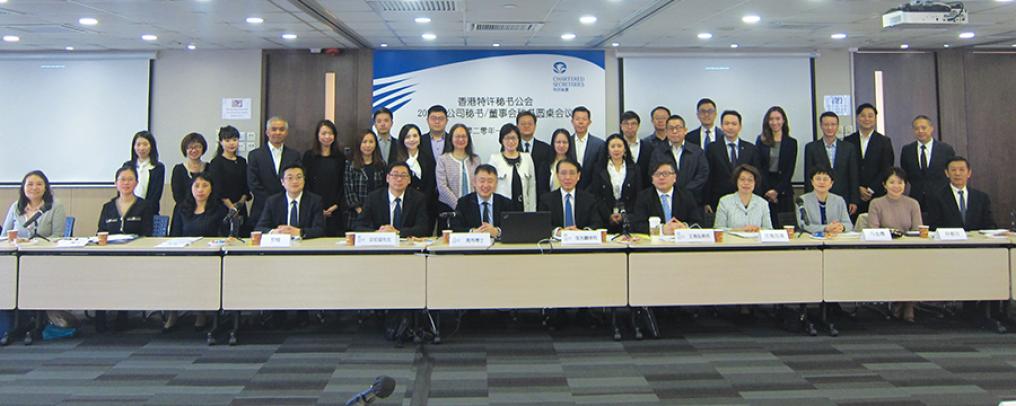The winner of The Hong Kong Institute of Chartered Secretaries (HKICS) Prize 2019, Edith Shih FCG(CS, CGP) FCS(CS, CGP)(PE) International President, The Chartered Governance Institute, and former HKICS President, looks at the road ahead for the profession under the governance banner.
What are your feelings on receiving the HKICS Prize?
‘I am honoured and humbled to join the company of previous HKICS Prize winners. I was very surprised that I got nominated since many of the previous winners were with HKICS for much longer than I was.’
Nevertheless, you have seen the profession’s repositioning exercise through and have also become the first female International President of The Chartered Governance Institute (CGI) from Asia.
‘Yes, the first female President of The Institute of Chartered Secretaries and Administrators (ICSA), the precursor of CGI, was Joan Bingley, and I am the second, as well as the first female International President of CGI from Asia and the first President from Hong Kong. My involvement with CGI, providing a link between it and HKICS, has been very important because recent years have seen tremendous changes for both bodies.
I became a Council member of ICSA when the repositioning exercise started and I was very fortunate to be able to see it through. It has been a long journey but we have achieved each milestone one by one – launching the Chartered Governance Professional qualification, changing the name of ICSA to The Chartered Governance Institute and most recently launching our new qualifying programme – the Chartered Governance Qualifying Programme. To achieve all of this we needed to get everyone’s buy- in. We also needed to change our Charter and Byelaws, and that was a lengthy process. It has been a very interesting learning experience.’
Are you happy with where this transition is taking the profession?
‘I am 100% sure that we are on the right track. We are all wedded to our past, most of us started as Chartered Secretaries, and there has been, particularly in the more established divisions, some questioning as to the wisdom of calling ourselves Chartered Governance Professionals.
I believe wholeheartedly that governance is the overarching remit of our profession. Underneath that big umbrella there will be people concentrating on the more administrative side of the company secretarial role and there will also be people, especially our more senior members, who will be involved in the compliance and governance advisory functions. Both of these aspects are part of governance one way or the other, so identifying ourselves as governance professionals gives us a title which represents what we’re doing and helps people understand our role better. I am sure that this is the way to go in the years to come.
The next step will be consulting on a name change for the Institute here in Hong Kong – this is at the top of the agenda. We started this process towards the end of last year. We held some consultation forums with senior members to be followed by consultations with our wider membership, but the social unrest at the end of last year and now the COVID-19 outbreak has meant that this is not the best time to organise large-scale forums. In the meantime, we are using our website to reach out to members. Hopefully we can have the membership vote on this no later than our AGM at the end of the year.’
Do you have a favoured name?
‘The main issue is whether to try to include both the “Chartered Secretary” and “Chartered Governance Professional” qualifications in the new name – that would make for a very long name of course. Some have suggested that this can be avoided by the use of an acronym, but this would mean less uniformity with the other divisions that have already become “governance” institutes. To date, already six out of our nine divisions use the term “governance”, namely Australia, Canada, Malaysia, New Zealand, Southern Africa and UKRIAT.
Personally, I think we should be looking forward so I would encourage everyone to choose a name that embraces our new mission as a global governance institute. As I have said, governance covers everything, including the traditional role of the company secretary.’
How will the repositioning exercise affect future training and thought leadership work?
‘Looking at training first, our new qualifying programme has been expanded to include more of a governance focus and this has also been true of our continuing professional development (CPD) services. The recent seminar we held here in Hong Kong on hybrid AGMs is a good example. This is a very timely topic with important governance implications. Many listed companies, my ones included, are proposing a switch to the hybrid format, particularly in the context of the current COVID-19 outbreak.
CGI was at the beginning of this whole debate when it published a paper on hybrid AGMs back in 2018. The paper and the video we made to accompany the paper were well-received because that was at the beginning of the interest in using technology to transform the AGM.
Turning to thought leadership – if we are to be a leader in the market we cannot just copy what other people are doing. We need to be publishing original papers exploring frontier topics in governance. That doesn’t have to apply to every paper we publish. We will of course still be publishing technical papers to help with specific areas of practice, but we also need to be publishing papers that get people thinking.
I was appointed the first Chair of CGI’s Thought Leadership Committee, and that has been a very important and integral part of our work for some time. The new paper authored by the current Chair of the Thought Leadership Committee, Peter Greenwood FCIS FCS, is a good example of the original papers we need to be publishing. ‘Corporate Governance – Beyond the Listed Company’ looks at the governance implications of the decline of stock exchange listings as a preferred structure for raising capital. I think it is important to bear in mind that not everyone has to agree with these types of papers, what is important is that they generate debate among our members about frontier topics of relevance to us.
In addition to these initiatives, I should also mention that CGI has launched its new e-community, which is already showing its value as a forum for members to debate current issues and exchange their views online.’
Will there be more of a focus on the governance role of directors in the years ahead?
‘Yes, we have already expanded our focus on directors. When I was on the Hong Kong Exchanges and Clearing Listing Committee, from time to time we would have disciplinary hearings and I was always surprised that people were prepared to take up directorships, come to meetings and tag along approving transactions without really knowing what was happening. Accountability is key. Directors are not just names in the company’s annual report, they have to do their homework and be accountable to the board, company, shareholders and stakeholders.
Our Corporate Governance Conference (CGC) 2020, which will be held on 25 September at the JW Marriott Hotel here in Hong Kong, will be on the theme: ‘Building the Modern Board: a 20/20 Vision’. CGI also has a thought leadership paper in the pipeline on directors’ accountability written by a Thought Leadership Committee member John Dinner.
This is quite timely. Regulators in Hong Kong have stepped up their enforcement and education work relating to directors duties. We have seen new regulations and disciplinary actions in Hong Kong, particularly regarding directors duties and inside information.’
Many jurisdictions around the world seem to be turning their backs on multilateralism and convergence of governance standards – will this be a problem for the profession in the years ahead?
‘I think we should really focus on governance outcomes rather than on the specifics of how one implements governance. Our division in Zimbabwe, for example, is the local institute for Chartered Secretaries and accounting professionals, so they have a different focus, but the end goal is the same. With this in mind, one can implement governance in the UK way, the Australian way or the Chinese way, but it is all governance. The core of what we do is to ensure that things are done ethically so, whatever the local environment, governance is universal.’
Nevertheless, there are significant differences in jurisdictions around the world in terms of the approach taken to transparency or accountability, the two most fundamental principles of governance. Does that become problematic, for example for members wanting to move to another jurisdiction, when the portability of the qualification was always one of its attractions?
‘I don’t think so. First of all, let’s look at our qualifying programme. We have to learn governance in accordance with what the syllabus teaches – that gives us the basics. I don’t agree that we should impose our standards on other people; everyone is their own champion, but I think the diversity of different approaches to governance makes it more important to have a gold standard. Your country might practice governance differently, some to a higher while others to a lesser standard, but we should always strive to achieve the highest possible standard.
You mention the portability of our qualification and that is a major advantage, but I think that it would be a minority of people who get this qualification so that they can move to work in a different jurisdiction. One would still have to fulfill additional minimum local requirements to start practising. If practitioners come from the UK to Hong Kong, for example, there would be conversion examinations and other procedures to go through to make sure that they meet local requirements. Local practices vary, but the basics should be the same and we all have the same core syllabus to work from.’
The profession is changing at lightning speed, so how should practitioners prepare themselves?
‘Actually, I don’t agree that the profession is changing at lightning speed. Our repositioning exercise is only designed to better represent what we have been doing for some time. Technology of course has been changing, but I don’t think these changes will be any surprise to our members if they keep up with their CPD requirements. If our Hong Kong members do their 15 hours of CPD per year, if they chose the right seminars to attend and do their own learning, they won’t be left behind. Technology has actually made learning a lot easier since we have been having more webinars and making seminars available online.’
What are the key trends that practitioners should be looking out for in the years ahead?
‘Environmental, social and governance (ESG) management has become an issue that goes beyond the listing rule requirements. The investor community is now putting pressure on banks not to lend to companies with poor ESG, so companies that fail to adapt will not be able to borrow, or will have to borrow at a much higher cost. On top of that, the rating agencies are giving companies a somewhat different set of ratings based on the quality of their ESG management and disclosure.
Another trend to watch is the shift away from shareholder primacy. I always used to believe that, as a listed company, our responsibility is first and foremost to our shareholders because they have invested their money in us. I still think I have a duty to make a return for them, but our responsibility is now also towards our other stakeholders – creditors, customers, suppliers, employees, regulators and even the public, etc. The shift to a multistakeholder model of governance is going to create additional workload for governance professionals.
I think cybersecurity, privacy and diversity issues will also be high on the agenda. The Stock Exchange has been looking at improving board diversity in Hong Kong for a number of years. This is not just about gender diversity, albeit that is the most visible aspect. I don’t want quotas to be imposed – directors have to fit the bill to be appointed rather than just because they tick the right diversity boxes. But I am beginning to think that perhaps tougher rules might be required. Just as with ESG, with tougher rules in place better board diversity will become a compliance issue and hopefully over time companies will claim ownership.’
Edith Shih was interviewed by CSj Editor Kieran Colvert.



